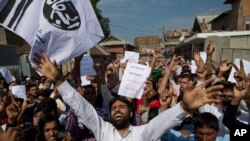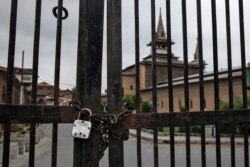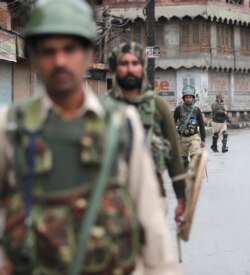Residents in Indian-controlled Kashmir offered prayers at neighborhood mosques on the Muslim festival of Eid-al-Adha, but curfew-like restrictions muted festivities in the region that has been in virtual lockdown since New Delhi revoked the area's autonomy last week.
Authorities maintained that one of the most important festivals of the year in Muslim-majority Kashmir took place peacefully.
As the main mosque in the capital, Srinagar, the Jama Masjid, long a focal point for separatist protests, remained off limits, residents offered prayers at small mosques.
Due to the restrictions, streets were largely deserted with markets shuttered. It was difficult for people to convey customary Eid greetings to each other because a communication blackout has seen internet and phone lines suspended to forestall anti-India protests.
Some protesters were reported to have gathered in one Srinagar neighborhood, chanting, “We want freedom.”
Roadblocks and barricades are in place virtually at all prominent locations in the city to prevent large gatherings and reporters have found it difficult to access all areas.
A tweet by Kashmir police said Eid festival prayers "concluded peacefully in various parts of the [Kashmir] Valley."
The Home Ministry noted some “isolated incidents” of stone-pelting and “minor, localized protests” but added that these were not unknown in Jammu and Kashmir.
The restive region, where a separatist insurgency has raged for three decades, is familiar with lockdowns, but the recent restrictions are much tighter than in the past.
Authorities have deployed thousands of additional troops in towns across Kashmir since last week’s sudden announcement that India was revoking the region’s constitutional provision to make its own laws, splitting it up and bringing it under New Delhi’s direct rule.
Some signs of normality had returned to the Himalayan region over the weekend as restrictions were eased to allow people to shop and stock up for the Eid festival. But the restrictions were reimposed after a handful of small protests erupted on Sunday. The Reuters news agency reported that some protesters carried banners which read, “Save Article 35 A.”
Most Kashmiris fear that scrapping Article 35 A — the legal provision that barred outsiders from owing land in the region, will flood Kashmir with people from other parts of the country, change its demography and submerge their “identity.”
Prime Minister Narendra Modi has said his government’s move to open up Kashmir is necessary for its economic development and to stop "terrorism." He has called on the private sector to help bring jobs to the region.
Investment promises
On Monday, India’s biggest business tycoon, Mukesh Ambani, promised investments in the two federally administered territories into which Jammu and Kashmir have been split. Ambani said that his company would make several announcements “in our development initiatives in the coming months.”
India’s radical step in changing Kashmir’s status also came up for discussion in China during a visit by Indian Foreign Minister Subrahmanyam Jaishankar to Beijing, which has been critical of the move.
Both sides appeared to downplay their differences, with Chinese Foreign Minister Wang Yi saying he hoped that India “would play a constructive role for regional peace and stability.” Jaishankar said bilateral differences should not become disputes.
Pakistan, which has downgraded diplomatic ties and suspended trade with India to protest the revocation of Kashmir’s autonomy, called for the Eid festival to be observed in a “simple manner” to express solidarity with Kashmiris on the Indian side of the region that is divided between them. Muslims traditionally slaughter goats for the holiday in tribute to the Prophet Ibraham's sacrifice of a lamb after God at the last moment spared Ishmael, his son.
Meanwhile, more than 300 mainstream Kashmiri political leaders, activists and separatists, detained since last week's announcement by the Indian government, continue to be in detention either at their houses or inside government buildings.













